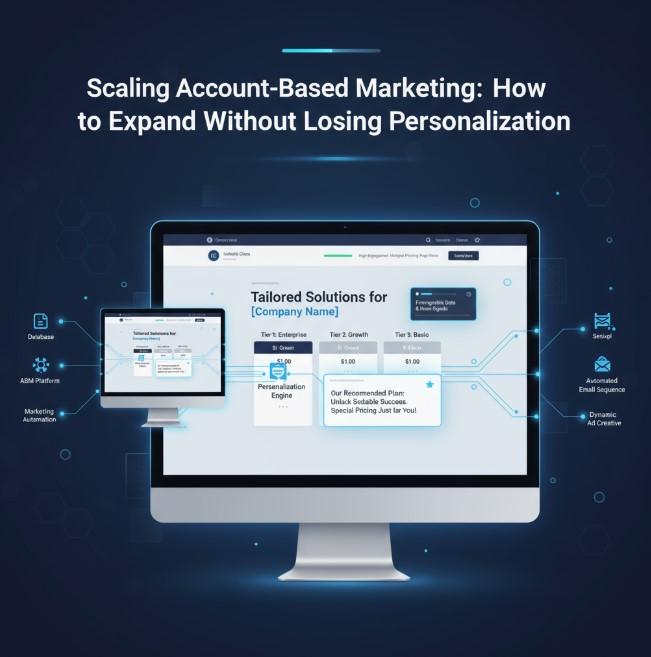Scaling Account-Based Marketing: How to Expand Without Losing Personalization

Account-Based Marketing (ABM) has become the backbone of modern B2B marketing strategies. By aligning marketing and sales teams around high-value accounts, ABM ensures resources are directed toward the opportunities with the greatest potential ROI. However, as organizations see success with a small number of targeted accounts, the natural next step is to scale ABM to a larger portfolio.
Here lies the challenge: how do you scale ABM campaigns without losing the deep personalization that makes them effective in the first place?
This blog explores the balance between scalability and personalization, the challenges of expansion, and proven strategies for executing ABM at scale in 2025.
What is Account-Based Marketing (ABM) and Why Scaling Matters
At its core, ABM is about quality over quantity—focusing on the accounts that matter most. Traditional lead generation aims for volume, but ABM ensures precise targeting and engagement.
Yet, many companies stop at “one-to-one” ABM, managing only a handful of accounts. While effective, this approach is resource-heavy and limits pipeline growth. Scaling ABM allows businesses to:
- Target more accounts without compromising quality
- Increase pipeline coverage and revenue opportunities
- Build repeatable processes for sustainable growth
- Optimize marketing and sales efficiency
According to Gartner, 72% of B2B marketers who scale ABM report higher ROI compared to traditional campaigns. The key lies in leveraging data, technology, and process standardization to keep personalization intact.
Challenges of Scaling ABM Without Losing Personalization
Scaling ABM isn’t as simple as multiplying the number of accounts. Here are the common roadblocks:
- Content Overload – Creating hyper-personalized content for dozens of accounts can overwhelm teams.
- Technology Gaps – Without robust ABM platforms, orchestration across channels becomes inconsistent.
- Data Fragmentation – Scattered intent data, CRM insights, and behavioral signals reduce targeting accuracy.
- Sales & Marketing Alignment – The more accounts you target, the harder it is to maintain alignment on priorities.
- Loss of Authenticity – Over-automation risks making personalization feel generic or templated.
The goal is to overcome these challenges with tiered personalization models, intent-driven insights, and technology-powered orchestration.
Proven Strategies to Scale ABM Without Sacrificing Personalization
1. Adopt a Tiered ABM Model
- Tier 1 (One-to-One): Deep personalization for strategic, high-value accounts.
- Tier 2 (One-to-Few): Segment accounts by industry, use case, or region, and create tailored campaigns.
- Tier 3 (One-to-Many): Use intent data and personalization technology to reach larger groups at scale.
This structure ensures the right balance of effort and impact across different account segments.
2. Leverage Intent Data for Targeting
Behavioral intent signals are critical for identifying which accounts are actively in-market. By integrating intent data with CRM and marketing automation platforms, marketers can prioritize accounts most likely to convert, ensuring efforts remain efficient even at scale.
3. Personalize at Scale with AI and Automation
AI-powered tools enable personalization without overwhelming human resources. Examples include:
- Dynamic content personalization on websites
- AI-driven email campaigns with custom subject lines
- Chatbots that adapt messaging based on account behavior
The key is to use automation to enhance, not replace, human-driven personalization.
4. Strengthen Marketing & Sales Alignment
Scaling ABM requires tighter collaboration than ever. Create:
- Shared account scorecards to track engagement and pipeline progress
- Joint account plans with clear ownership
- Regular syncs between marketing and sales for feedback loops
Alignment ensures that as account numbers grow, efforts remain coordinated and purposeful.
5. Invest in ABM Technology Stack
Platforms like Demandbase, 6sense, and Terminus are designed to help organizations orchestrate ABM campaigns at scale. These tools provide:
- Unified dashboards for account insights
- Multi-channel engagement orchestration
- Measurement frameworks for ABM ROI
Without the right tech stack, scaling becomes chaotic and personalization suffers.
Future of Scalable ABM in 2025
The future of ABM lies in data-driven precision and AI-assisted personalization. Some emerging trends include:
- Predictive analytics to identify accounts before they signal intent
- Connected omnichannel engagement across email, social, CTV, and events
- Hyper-automation to reduce manual workload
- Customer marketing as an extension of ABM to drive expansion and retention
In 2025 and beyond, scaling ABM won’t just be about reaching more accounts—it will be about creating smarter, context-driven experiences that strengthen long-term relationships.
Pro Tips & Bonus Insights
- Use content atomization—break down long-form assets into personalized snippets for different accounts.
- Build ABM playbooks to replicate successful campaigns across industries.
- Track account engagement scores rather than just leads to measure impact more accurately.
- Integrate customer success teams into ABM scaling efforts for upsell and cross-sell opportunities.
Conclusion
Scaling Account-Based Marketing is not about choosing between volume and personalization—it’s about strategically combining the two. With tiered ABM models, AI-driven personalization, intent data, and seamless sales-marketing alignment, B2B brands can scale ABM without losing its effectiveness.
In 2025, organizations that master scalable ABM will turn account engagement into predictable revenue growth.
- Art
- Causes
- Crafts
- Dance
- Drinks
- Film
- Fitness
- Food
- Giochi
- Gardening
- Health
- Home
- Literature
- Music
- Networking
- Altre informazioni
- Party
- Religion
- Shopping
- Sports
- Theater
- Wellness




